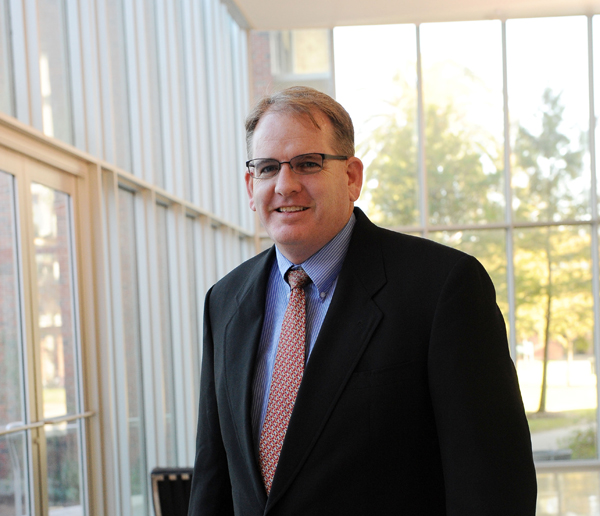Becoming a “school of choice” for prospective students is a big part of Dean Ira Solomon’s vision for the Freeman School, and it’s also a big part of what attracted Patrick Foran, the new director of graduate admissions, to the Freeman School.
“There’s a lot of potential here, but the big question is how do you make that potential a reality,” says Foran, who joined the Freeman School in July. “When I met with Dean Solomon, I got a feel for what they wanted to do and how we could make that happen, so that’s really the attraction for me—how do you come in and grow things and improve things. I just thought it was a really great opportunity.”
Foran comes to the Freeman School with more than nine years experience in MBA admissions. Most recently, he served as director of Manchester Business School’s Miami Center, where he was responsible for launching the first ever satellite facility of a British business school in the U.S. Prior to that, Foran was Director of MBA admissions at the University of Florida’s Hough Graduate School of Business with responsibility for the professional, executive and Internet programs, where he doubled the annual enrollment of those programs in six years.
A graduate of the U.S. Coast Guard Academy, Foran served as operations officer on Coast Guard Cutter Mariposa, a Great Lakes buoytender, and then in the Coast Guard regional headquarters in Boston, where he analyzed vessel traffic patterns and designed systems to aid navigation, such as buoys and lights. After 10 years in the Coast Guard, Foran left to pursue an MBA.
“I really wanted to move into marketing and I kept finding that potential employers were not in awe of my extensive knowledge and expertise about buoys,” he deadpans.
After earning his MBA from Duke University, Foran worked in the Marketing-Chemicals group of CSX Transportation and then as a product manager for Exactech Corp., a medical device manufacturer. Looking back, Foran says both jobs in their own way helped to prepare him for his current role at the Freeman School.
“Most of the chemicals CSX transports come from the same Gulf Coast energy locations the Tulane Energy Institute focuses on, so I had the opportunity to fly into New Orleans and travel around Louisiana meeting with chemical companies,” Foran says. “Working for Exactech, I got a real understanding of entrepreneurial culture and vision and the amazing amount of work it takes to create and sustain a business. There were less than 100 employees when I joined the company. Today, the company has over 500 people worldwide.”
The Freeman School is currently in the midst of a major strategic planning process designed to identify areas and programs with a legitimate opportunity to become among the best in the nation. Foran says finance, accounting, energy and entrepreneurship are likely to remain among the school’s signature programs, but with all offerings, his goal as director of admission is to offer students a compelling narrative on why attending Freeman makes sense.
“Enrolling in business school is a logical decision, and the essence of that decision is return on investment,” Foran says. “Does spending this much on tuition and sacrificing this much in lost wages make sense for me? We need to be able to clearly demonstrate for students that it is a smart decision— that if they come here and do this program, then this is the likely outcome.”
That’s not to say attending business school is purely logical. It’s also an emotional decision, and Foran says that’s the part of the equation the Freeman School doesn’t have to worry about.
“Prospective students need to be able to say this is a place I want to be and a place I want to spend some time,” Foran says. “Tulane gives that to people.
“I mean Durham, N.C., is a nice place. But it’s not New Orleans.”


